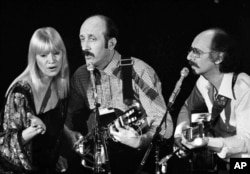Peter Yarrow, singer-songwriter, best known as one-third of the folk-music trio Peter, Paul and Mary, whose soulful tunes captivated millions as he spoke out in favor of civil rights and against the war Yes, he has passed away. He was 86 years old.
Yarrow, who also co-wrote the group’s most enduring song, “Puff the Magic Dragon,” died Tuesday in New York, publicist Ken Sunshine said. Yaro was suffering from bladder cancer for the last four years.
“Our fearless dragon is tired and has entered the final chapter of his glorious life. The world knows the iconic folk activist Peter Yarrow, but the man behind the legend is every bit as generous, creative, passionate, playful and intelligent The lyrics suggest,” his daughter Bethany said in a statement.
During an incredible run of success in the 1960s, Yarrow, Noel Paul Stookey and Mary Travers released six Billboard Top 10 singles and two No. 1 albums and won five Grammys.
He brought Bob Dylan early recognition by having two of his songs, “Don’t Think Twice, It’s All Right” and “Blowin’ in the Wind”, become Billboard top 10 hits, as he helped lead an American renaissance in folk music. Was done. , She performed “Blowin’ in the Wind” at the 1963 March on Washington, at which the Reverend Martin Luther King Jr. delivered his famous “I Have a Dream” speech.
After an eight-year hiatus to pursue solo careers, the trio reunited in 1978 for “Survival Sunday”, an anti-nuclear power concert that Yarrow organized in Los Angeles. They would remain together until Travers’ death in 2009. After his passing, Yarrow and Stookey continued to perform separately and together.
Born in New York on May 31, 1938, Yarrow was raised in an upper-middle-class family that valued the arts and scholarship. He took violin lessons as a child, later taking up guitar after absorbing the work of folk music icons such as Woody Guthrie and Pete Seeger.
Upon graduating from Cornell University in 1959, he returned to New York, where he worked as a struggling Greenwich Village musician until joining Stookey and Travers. Although her degree was in psychology, she found her true calling in folk music at Cornell when she worked as a teaching assistant in a class on American folklore her senior year.
Soon after returning to New York, he met impresario Albert Grossman, who would go on to manage Dylan, Janis Joplin, and others and who at the time was looking to put together a group that could rival the Kingston Trio. Which was a hit in 1958. Version of the traditional folk ballad “Tom Dooley”.
But Grossman wanted a trio with a female singer and a member who was funny enough to keep the audience engaged through comic patterns. For the latter, Yarrow suggested a guitar-playing Greenwich Village comic he had seen named Noel Stookey.
Stookey, who would use his middle name as a member of the group, was a friend of Travers, who had performed and recorded with Pete Seeger and others as a teenager.
After months of rehearsals, the trio became an overnight sensation when their first album, 1962’s “Peter, Paul and Mary,” reached No. 1 on the Billboard charts. Their second, “In the Wind”, reached number 4 and their third, “Moving”, brought them back to number 1.
From their early albums, the trio explored war and injustice in songs such as Seeger’s “If I Had a Hammer” and “Where Have All the Flowers Gone,” Dylan’s “Blowin’ in the Wind” and “When the Ship Comes In.” Sang against. ” And Yarrow’s own “The Day Is Done.”
They can also show a softer and poignant side, notably on “Puff the Magic Dragon”, which Yarrow wrote with college friend Leonard Lipton during his Cornell years.
It tells the story of a young boy named Jackie Pepper, who goes on countless adventures with his fake dragon friend until he is overtaken by such childhood fantasies and leaves behind a crying, broken heart. The one leaves the puff. As Yarrow explains: “A dragon lives forever, but not so little boys.”
After recording their last No. 1 hit, a cover of John Denver’s “Leaving on a Jet Plane” in 1969, the trio split up the following year to pursue solo careers.
That same year, Yarrow pleaded guilty to indecent assault on a 14-year-old girl who had come to his hotel room with her older sister asking for an autograph. When they opened the door and let him in, the couple found him naked. Yarrow, who resumed his career after three months in prison, was pardoned by President Jimmy Carter in 1981. For decades, he apologized again and again.
Over the years, Yarrow continued to write and co-write songs, including the 1976 hit “Torn Between Two Lovers” for Mary McGregor. He received an Emmy nomination in 1979 for the animated film “Puff the Magic Dragon.”
Later songs include the civil rights anthem “No Easy Walk to Freedom”, co-written with Margery Tabankin, and “Light One Candle”, which calls for peace in Lebanon.
In addition to his wife and daughter, he is survived by a son, Christopher, and a granddaughter, Valentina.
